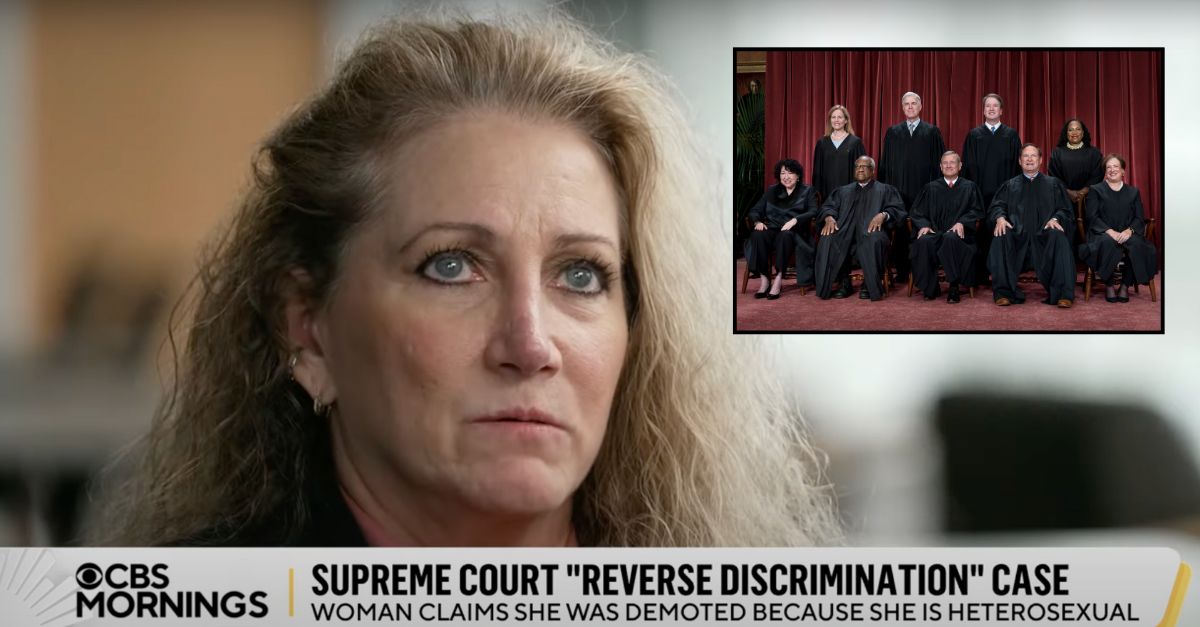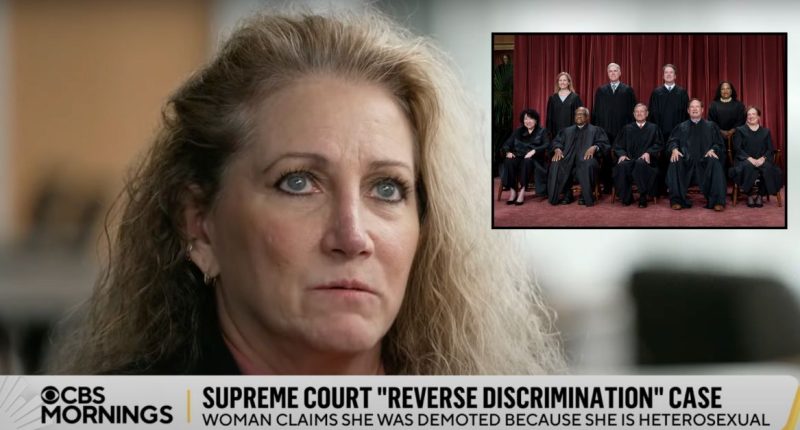
Main: Marlean Ames (screengrab via CBS News); Inset: Members of the Supreme Court sit for a new group portrait in Washington, Friday, Oct. 7, 2022. Bottom row, from left, Associate Justice Sonia Sotomayor, Associate Justice Clarence Thomas, Chief Justice of the United States John Roberts, Associate Justice Samuel Alito, and Associate Justice Elena Kagan. Top row, from left, Associate Justice Amy Coney Barrett, Associate Justice Neil Gorsuch, Associate Justice Brett Kavanaugh, and Associate Justice Ketanji Brown Jackson (AP Photo/J. Scott Applewhite).
The nation’s highest court heard arguments in what many are calling a “reverse discrimination” case, in which a straight plaintiff sued her state agency employer for violating federal antidiscrimination law for passing her over for a promotion because she is straight and not gay.
The case gives the justices the chance to scrap a rule that requires “majority” plaintiffs in discrimination cases to adhere to a higher burden of proof than those who claim they were discriminated against for being part of a minority class.
Marlean Ames’s discrimination claim
Marlean Ames claims that she is a victim of sexual orientation discrimination at the hands of her employer, the Ohio Department of Youth Services (ODYS), because she was not hired for a job she wanted. ODYS supervises the confinement and rehabilitation of children and teenagers who commit felonies, and Ames worked for 18 years as an executive secretary before being promoted to program administrator in 2014.
Three years later, Ames began reporting to a new supervisor, Ginine Trim, who is gay. Trim gave Ames a favorable review in a 2018 performance evaluation. However, the next year, Ames applied for — but did not get — a new position as a bureau chief. Shortly thereafter, Ames was removed from her position as program administrator. She was given the option to return to her previous job, but at a salary that would go from $47.22 an hour to $28.40 per hour.
Ames stayed at ODYS and later received a different promotion. The department then hired a gay woman for the bureau chief position that Ames wanted and a gay man for the program administrator position that Ames previously held. Ames claims that she was passed over while less qualified individuals were hired despite their lack of qualifications.
By contrast, ODYS maintains that Ames was demoted after a new governor took office and the agency restructured its operations, and that Ames had difficulties getting along with coworkers.
Ames sued for violation of her rights under Title VII of the Civil Rights Act. She lost at both the district and circuit court levels.
A circuit split on a rule for the majority
The issue in the case is not whether a member of a majority group can ever be the victim of discrimination — they certainly can. Rather, the issue is whether as a member of a majority group, Ames is required to provide additional evidence that a gay plaintiff would not need to prove.
Most federal courts consider discrimination claims in the same way regardless of whether the plaintiff is a member of a majority or minority group. Put another way, the same standards are used to assess racial discrimination against Black and white people or sex discrimination against gay or straight people.
However, some federal circuits, including the Cincinnati-based U.S. Court of Appeals for the Sixth Circuit where Ames’s case proceeded, apply a rule in which “majority” plaintiffs are required to show “background circumstances to support the suspicion that the defendant is that unusual employer who discriminates against the majority” in order to survive summary judgment.
In its ruling in favor of ODYS, the Sixth Circuit issued a per curiam opinion in which it said that because Ames is straight, she does need to show “background circumstances.” Donald Trump SCOTUS shortlister Judge Raymond Kethledge penned a separate opinion in the case agreeing with the holding, but slamming the background circumstances rule as one that unfairly, “impose[s] different burdens on different plaintiffs based on their membership in different demographic groups.” Kethledge called the rule a “deep scratch across [the] surface” of Title VII that discriminates in the very way the statute forbids.
Agreement in court
Joe Biden’s administration participated in the case at the briefing stage, in which then-Solicitor General Elizabeth Prelogar said government agrees with Ames that the “background circumstances” requirement is not supported by Title VII’s text and is inconsistent with Supreme Court precedent.
Assistant to the Solicitor General Ashley Robertson argued the case Wednesday on behalf of the Department of Justice, and took the same position.
ODYS argued in briefs that the “background circumstances” requirement is not really an additional element for which plaintiffs are forced to bear the burden, but rather, simply a “method of analysis” to be used by the court.
During the roughly hourlong oral arguments, there appeared to be relative agreement among the justices — and at times, even the opposing litigants.
“At bottom, all Ms. Ames is asking for is equal justice under law,” said attorney Xiao Wang, who argued on Ames’s behalf. “Not more justice, but certainly not less. And certainly not less because of the color of her skin or because of her sex or because of her religion.”
“We’re in radical agreement today on that, it seems to me,” Justice Neil Gorsuch commented at one point in the proceedings.
Ohio Solicitor General T. Elliot Gaiser, who argued in defense of the Sixth Circuit’s decision, said that, “Ohio agrees it is wrong to hold some litigants to a higher standard” because of their identity and that plaintiffs like Ames “should have the same burden” as a gay plaintiff who likewise alleged discrimination.
Justice Elena Kagan noted that the topics on which Gaiser appeared to debate were about issues that have “nothing to do with” the central question in Ames’s case.
The justices teed up the case for a relatively narrow ruling in Ames’s favor that potentially reiterates some of what the Court said in the 2022 case that eradicated affirmative action in college admissions. In the case, Chief Justice John Roberts wrote that equal protection is “universal in its application.”
A ruling in Ames’s favor by the justices, however, would not mean that she wins her discrimination lawsuit against ODYS. Rather, it would likely mean that her case is revived such that she would have the opportunity to proceed and have the chance to prove her allegations.
You can listen to Wednesday’s full oral arguments here.
Love true crime? Sign up for our newsletter, The Law&Crime Docket, to get the latest real-life crime stories delivered right to your inbox.







